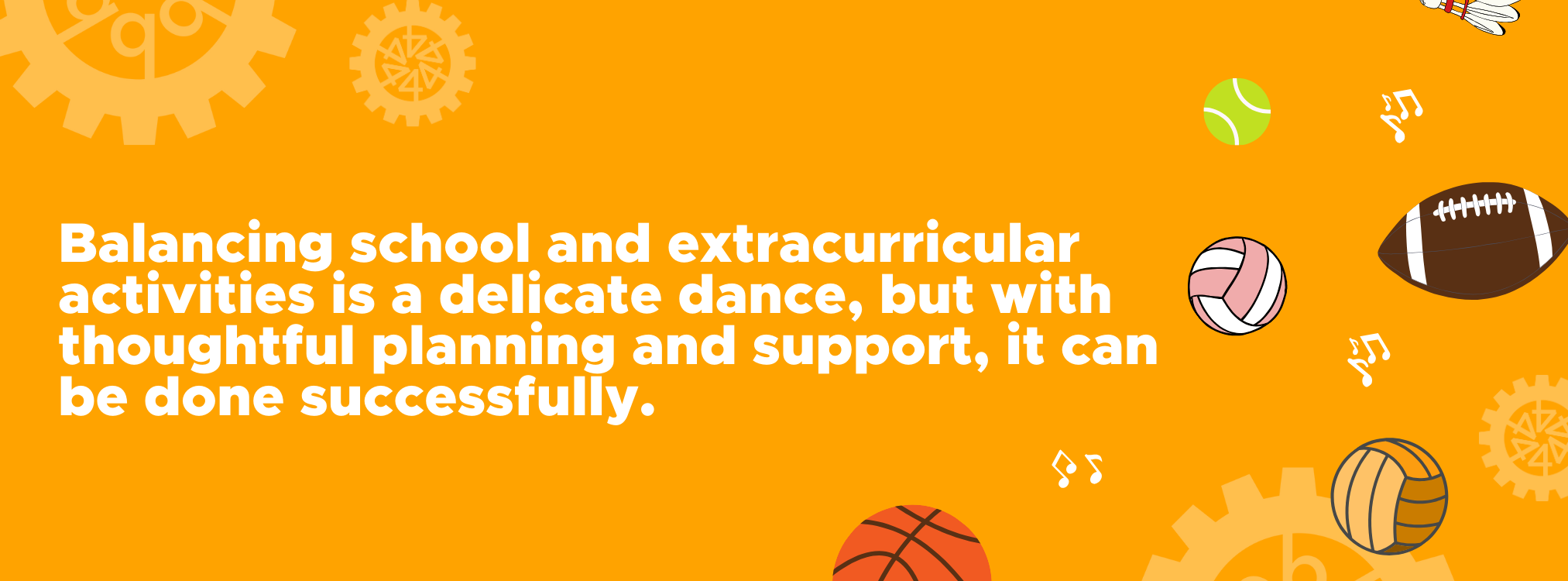Balancing School and Extracurriculars: A Guide for Parents

Balancing school and extracurricular activities can often feel like a challenging juggling act. On one side, there are academic responsibilities; on the other, the vibrant world of sports, arts, and hobbies. For children aged 5 to 16, finding equilibrium between these areas is essential. It’s not just about preventing burnout or avoiding academic slip-ups; it’s about nurturing a well-rounded, fulfilled child who thrives both inside and outside the classroom.

Why Balance Matters
Academic Achievement and Extracurriculars: A Symbiotic Relationship
It’s easy to view school and extracurricular activities as separate entities, but in reality, they’re deeply interconnected. Studies have shown that children who engage in extracurricular activities often perform better academically. This is because extracurriculars teach valuable skills such as time management, discipline, and perseverance. These skills can directly enhance study habits and academic performance.
For instance, a child involved in sports learns about setting goals and working diligently to achieve them, both in and out of class. This mindset can be applied to school projects and tests. Similarly, a child participating in music lessons develops concentration and patience, traits that are beneficial for academic success. Engaging in activities outside the classroom helps children learn how to balance multiple responsibilities, a skill that is invaluable throughout their lives.
The Risk of Overloading
While extracurriculars can enhance academic performance, overloading your child with too many activities can lead to stress and burnout. A packed schedule with little downtime can detract from academic focus and lead to a decline in school performance. It’s crucial to recognise the signs of overload: fatigue, irritability, and a noticeable drop in grades. Ensuring your child has a balanced schedule is key to their overall well-being.
Overloading can also diminish the enjoyment they get from their activities, turning what should be a positive experience into a stressful obligation. By carefully managing their commitments, you can help ensure that they continue to enjoy their activities and benefit from them without feeling overwhelmed.
Personal Growth and Social Skills
Extracurricular activities offer more than just academic benefits; they provide opportunities for personal growth and the development of social skills. Whether it’s learning to collaborate in a team sport or expressing oneself in a theatre group, these experiences are invaluable. They help children build confidence, develop leadership skills, and learn the importance of teamwork - qualities that will serve them well throughout their lives.
Being part of a club or team can also teach children about resilience and adaptability. These experiences help them navigate social situations, handle conflicts, and work towards common goals with others. Such skills are essential not only in their academic journey but in their personal and future professional lives.

Finding the Right Balance
Understand Your Child’s Interests and Needs
Start by understanding what your child enjoys and where their passions lie. It’s essential to support their interests but also to ensure they don’t overextend themselves. For younger children, this might mean introducing them to a variety of activities to see what sparks their interest. For older children, it’s about finding a manageable number of activities that align with their interests and academic goals.
Pay attention to their responses and energy levels. If they are excited and eager to participate in an extracurricular activity, it’s a good sign that they are engaged. However, if they seem drained or reluctant, it may be a signal that their schedule needs adjustment. Balancing their interests with their academic needs is key to their overall happiness and success.
Create a Realistic Schedule
Work with your child to create a weekly schedule that balances schoolwork, extracurricular activities, and downtime. A visual schedule can help them see how their time is divided and manage their commitments effectively. Include time for homework, practice sessions, and leisure activities. Remember, downtime is as important as structured activities; it allows children to relax and recharge.
A well-organised schedule can reduce stress and increase productivity. It helps children understand how to allocate their time efficiently, which is a valuable skill for both their current and future academic and personal lives.
Prioritise and Set Goals
Help your child set realistic goals for both their academic and extracurricular pursuits. Setting specific, measurable, achievable, relevant, and time-bound (SMART) goals can help them stay focused and motivated. For example, if they’re involved in soccer at both a club and school, a SMART goal might be improving their maths grade by a certain percentage while maintaining their performance on the soccer field.
Encourage them to set short-term and long-term goals. Short-term goals might include completing a project or improving a skill, while long-term goals could involve achieving a grade or mastering a new ability. This approach helps children stay motivated and provides them with a clear sense of direction.
Encourage Open Communication
Keep the lines of communication open with your child. Regularly check in to see how they’re feeling about their schedule and activities. If they’re struggling to keep up with their academic work or feeling overwhelmed by extracurricular commitments, have a discussion about adjusting their schedule. It’s essential for them to feel supported and understood.
Discussing their feelings and experiences helps them feel validated and supported. It also provides you with insights into how they’re managing their commitments and where adjustments might be needed.
Monitor and Adjust
Balance is not a static goal but a dynamic one. Periodically review your child’s schedule and performance. If you notice signs of stress or a drop in academic performance, it might be time to reassess their commitments. Flexibility is key; sometimes adjusting an activity or reducing its frequency can make a significant difference.
Regular reviews help ensure that your child’s schedule remains effective and enjoyable. Adapting their activities based on their evolving needs and interests keeps them engaged and prevents burnout.

The Role of Parents
As a parent, your role is to guide and support your child in finding this balance. Lead by example - demonstrate good time management and stress management skills. Encourage your child to pursue their passions but also to understand the importance of academic responsibility. Your involvement and support are crucial in helping them navigate this balancing act.
Be Encouraging
Celebrate your child’s achievements in both academics and extracurriculars. Your encouragement and support will motivate them to strive for their best while maintaining a healthy balance. Positive reinforcement helps build their confidence and reinforces the value of their efforts.
Acknowledging their hard work and successes reinforces their positive behaviours and encourages them to continue pursuing their interests with enthusiasm and dedication.
Model Balance
Show your child how you manage your own responsibilities and interests. Whether it’s juggling work and hobbies or managing a busy schedule, demonstrating a balanced lifestyle can teach them valuable lessons about managing their own time effectively.
By modelling a balanced approach to your own life, you provide a tangible example for your child to follow. This teaches them that it is possible to achieve harmony between different aspects of their lives.

Conclusion
Balancing school and extracurricular activities is a delicate dance, but with thoughtful planning and support, it can be done successfully. The goal is not just to avoid academic decline but to foster a well-rounded, confident, and resilient individual. By understanding your child’s needs, creating a balanced schedule, and providing ongoing support, you set them up for success both in the classroom and beyond.
If you're finding it challenging to achieve the right balance or are concerned that your child might be falling behind academically, it could be a great time to consider engaging a tutor. At NumberWorks’nWords, our dedicated tutors are committed to making sure every child who comes to our centres leaves feeling confident and pleased with their learning progress. We aim to take the stress out of at-home study sessions, allowing you to focus on enjoyable family bonding during your time together.
If you think your child could benefit from our services, we would love to hear from you. Contact us today or book a free, no-obligation learning assessment.




